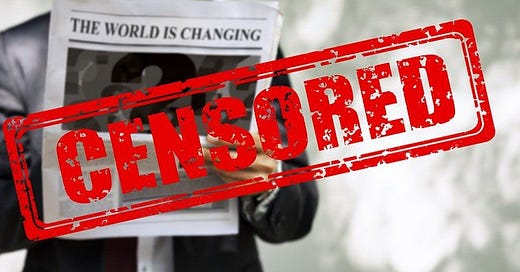Malaysia’s clandestine censorship and suppression of free speech
Bullying social media platforms to cooperate
With Malaysia’s huge leap of 40 places on the World Press Freedom Index earlier this year, the Fahmi Fadzil, the Communication and Multimedia Minister in the new Anwar Ibrahim government boasted of the administration’s commitment to media freedom and a good atmosphere for journalists.
Malaysia had jumped an unprecedented 40 places in the Reporters Without Borders Press Freedom Index, being ranked 73 out of 180 countries, the best in the region. Malaysia under previous administrations had a reputation for prosecuting journalists and activists, forcing them to incur massive legal expenses and possible bankruptcies. The police often carried out searches of media outlets, and expelled foreign journalists, who were critical of the government.
Prime minister Anwar Ibrahim went on record saying that “journalists in the country should feel free to report the news in the new era if it involves criticizing the prime minister and the leadership”.
Qualifications brought in
Before the state elections held last August, the government said that anybody bringing up issues concerning race, religion, and royalty (the 3Rs) would be investigated by the police for possible sedition and criminal defamation. The prime minister himself went into an outburst at a student who asked about the quota system for places at public universities. Anwar brought up the issue of the so-called ‘social contract’ as a reason this issue shouldn’t be discussed or challenged.
The 3Rs and ‘social contract’ were used as tools of censorship by the Mahathir government back in the 1980s.
Clandestine media repression going on today
A number of activists and news portals talking and writing about corruption issues concerning government contracts awarded to companies, and land swaps utilized as the terms of payment, found themselves with defamation letters of demand and suits for civil defamation. These threats were launched by corporations against individuals and news portals that are only surviving financially on a marginal basis.
Consequently, a number of online news portals made informal and ‘secret agreements’ with these companies not to mention the issue in future or carry any material criticizing their corporations and activities. Online new portals have complied, as most cannot financially defend any legal action, even though it may be frivolous and supercilious.
Media discussion on corporate dealings with government that appears to be outside normal government guidelines and opaque has mostly disappeared in the Malaysian media.
The practice of self-censorship by news portals is now at an all time high.
At the same time, a number of online news portals and bloggers have been illegally blocked by the Malaysian Communications and Multimedia Commission (MCMC). Sites like Utusan TV, Malaysia Today, Wee Choo Keong, and the Malaysian Chronicle, and Malaysia Now have all been blocked. Investigation of these blocks by Wee Choo Keong indicated the MCMC was behind these blocks, although the MCMC has either denied or remained silent over the issue. Some of these blocks have been intermittent, where some internet service providers (ISPs) would spasmodically allow access. The Author’s site Murray Hunter has been blocked since October 7. The responsible minister Fahmi Fadzil has also ignored media questions on this issue.
These blocks break national laws as the site owners have not been notified and given any reasons for the blocking of their sites.
Forcing collaboration of social media platforms
Meanwhile, activists are finding their posts on social media platforms like Facebook and YouTube are either, restricted or pulled down. Even posts on the ‘liberal’ Twitter (X) are being restricted. Some posts have been restricted to the point that nobody actually is reading them. This is being undertaken on the pretext of preventing fake-news, mis and dis-information. Those posting to social media are not informed if their posts are being restricted, particularly those at the request of the MCMC.
The government has admitted its working with social media to roll out more censorship. The Malaysian government has even gone to the extent of taking legal action against Meat and Tik Tok for failing to take down ‘undesirable content’. These threats were withdrawn when both social media platforms agreed to cooperate.
The Communications and Digital minister Fahmi said his ministry is looking at steps to strengthen compliance with the law on social media platforms. These include holding social media companies accountable for what is on their platforms, and licensing platforms, and users.
Cancelling press passes
Not all censorship has been covert. The government just recently revoked the press passes of two journalists covering the national parliament. These journalists work for Harakah, the official organ of the opposition Parti Islam Se-Malaysia (PAS).
Media repression in Malaysia has returned to the times of former prime minister Mahathir Mohamed in the early 2000s and former prime minister Najib Razak after 1MDB reports where published in the media. It clearly apparent Malaysia’s miraculous rise in the Press Freedom Index will be very short lived.
Originally published in the Eurasia Review 18th November 2023
Subscribe Below:





MCMC = Malaysia's Communist Media Censors